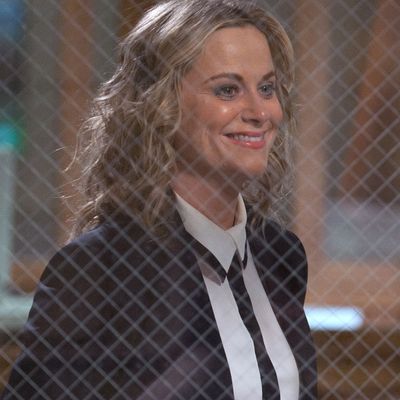
I cried during last nightÔÇÖs Parks and Recreation finale because IÔÇÖm not a monster. Of course I cried. Everyone lives so happily ever after! Leslie had such a great explanation of why one might want to have children! You could even hear Mouse RatÔÇÖs greatest hits playing. Viva sincerity. That explains most of why I cried, but a tiny bit was residual crying from ParenthoodÔÇÖs very similar flash-forward-oriented series finale a few weeks ago. If this becomes the go-to way for shows to end, that is more than fine by me.
This device has been executed gracefully over the years.┬áSix Feet Under is the high-water mark for this kind of finale, but showing how everyone dies only makes sense on a show about ÔǪ well, how everyone dies. The West Wing put a slightly gentler spin on it, showing everyone several years into the future. They did it briefly, but thoroughly enough that we know Danny and CJ had twins, CharlieÔÇÖs an ambassador, TobyÔÇÖs a professor, and so on. Things worked out. On Parenthood, I needed to know that Amber┬áwould be okay, and she is; she married (or something-ed) Jason Street, so she is basically the president of Earth. ThatÔÇÖs all I ask for: perfect, emotionally validating closure in all things. We canÔÇÖt get that in life, but we can get it from TV.
This kind of ending┬áworks especially well on shows where the audience has bonded deeply with the characters. I loved The Shield with a passion most people reserve for their children, and yet I never felt like I was right there with Vic Mackey. But when Josh got shot on The West Wing, my first thought was, Take me instead, Lord. I am content to imagine a happy ending for Jesse Pinkman. But I am genuinely so relieved to know that Claire Fisher wound up with her reliable Republican boyfriend. The characters on Parks had an even more intimate link to the viewers because they look right into the camera and talk right to us. I couldnÔÇÖt have been happier for Donna if that were my own be-diamonded watch.
Finales are tough. Not everything lends itself to this scrapbook-of-the-future model, particularly gritty or tightly drawn dramas. Can you imagine Mad Men showing us an aged Don, in the ÔÇÖ80s, chillaxing in retirement? I canÔÇÖt. But thatÔÇÖs because Mad Men doesnÔÇÖt operate with the idea that on some level Don Draper and I would or could form a personal bond. Parks wanted us to love Leslie the way weÔÇÖd love a friend, and I sure did. And like any friend you donÔÇÖt get to see anymore, sometimes you wonder what happened to her. ÔÇ£She kind of maybe became presidentÔÇØ is an extremely satisfying answer.

